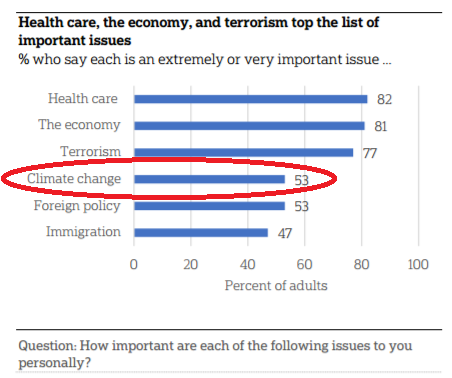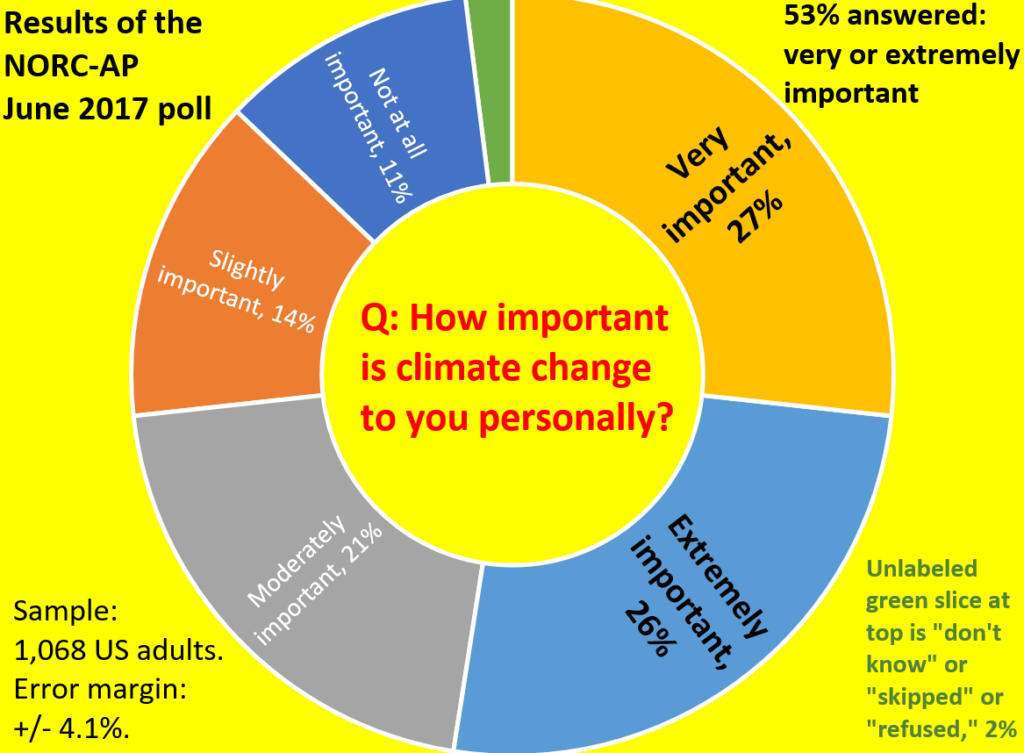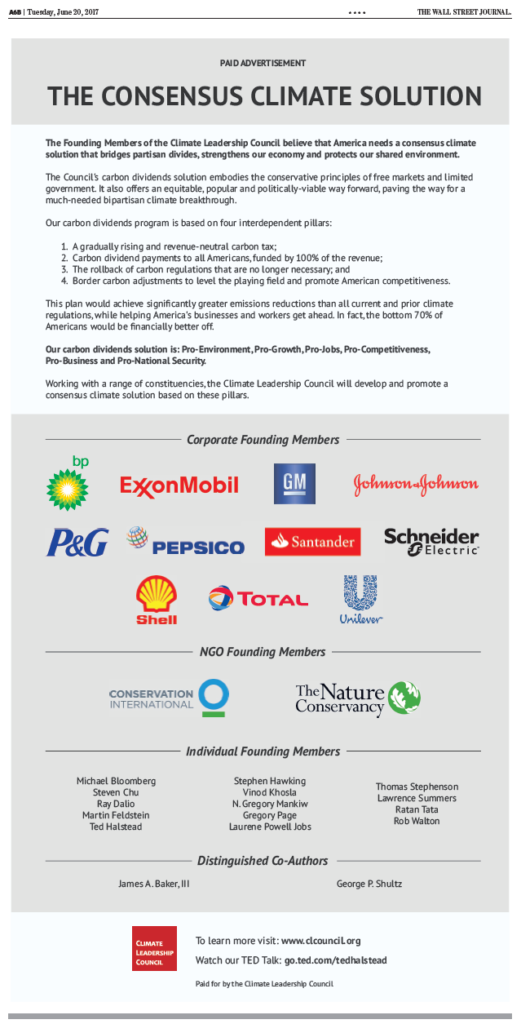The Climate Leadership Council today announced that it has won support for its carbon dividends plan from ExxonMobil and other major corporations, as well as prominent individuals including physicist Stephen Hawking. The news, reported in op-ed pieces, news stories and a full-page ad in the Wall Street Journal’s Washington, DC edition, comes just four days after release of a new poll suggesting that climate concern among U.S. voters is surging to new heights.

Graphic from NORC-AP poll released 6-16-2017 (annotation by CTC).
Let’s start with the poll, released last Friday by the widely respected National Opinion Research Center – Associated Press polling collaborative. While the June 16 NORC-AP press release led with Pres. Trump’s abysmal (64%) disapproval rating, the more momentous result was the one highlighted in the graphic.
Fifty-three percent of people polled called climate change “extremely or very important” to them personally, perhaps the first time a majority of U.S. respondents assigned climate change such a high level of concern. Indeed, climate is often viewed in political circles as a “low-salience” issue, one that people profess to care about but don’t act on politically.
The 53% figure belies that idea, though the response might have been heightened somewhat because respondents were asked to specifically rate climate (and other issues) rather than to name, say, “the three most critical issues to you and your family.” (The full poll may be downloaded here. See graphic below for a breakout of the climate responses.)

Climate change is now “extremely or very important” to a majority of Americans.
The apparent broadening of public concern could translate into repudiation of climate-denying and ignoring candidates in the 2018 Congressional primaries and elections. It may also provoke more members of Congress to endorse the Citizens’ Climate Lobby’s Republican Climate Resolution or take seriously the Climate Leadership Council’s Republican-branded carbon dividends plan.
That plan was formally endorsed today by ExxonMobil, along with fellow oil behemoths BP, Royal Dutch Shell and Total S.A.; industrial giants General Motors, Pepsico and Unilever; and prominent individuals like former NYC mayor Michael Bloomberg, former Obama Treasury Secretary and Harvard University ex-president Larry Summers, renowned physicist Stephen Hawking, and Nobel Laureate and Obama Energy Secretary Steven Chu.

CLC’s Wall St Journal ad. Click link in text at bottom for easier read.
The broadening of support, orchestrated by Climate Leadership Council executive director Ted Halstead, constitutes an effort to move simultaneously to the left and right: leftward with a relatively high starting carbon tax rate ($40 a ton) and the income-progressive “dividending” of tax revenues rather than cuts to corporate taxes; and rightward with the backing of ExonMobil, which many climate activists hold in contempt for its decades of funding a network of climate denialists who have helped paralyze climate action in the U.S.
From time to time ExxonMobil has said that it “supports” carbon taxes, but as we reported late last year, it has never backed actual carbon tax legislation and has limited its expressed interest to carbon taxes in the $20/ton range. ExxonMobil’s endorsement of the council’s plan is a step forward for the company that could portend support from other quarters long considered hostile or passive on carbon pollution pricing.
With a high starting tax rate, a commitment to disbanding most federal carbon regulation and an offer to indemnify carbon polluters from litigation over climate damage, the council’s proposal defines a broad new center that could eventually unite political forces from the left and right. That strategy appeared today to gain important validation from Michael B. Gerrard, the influential director of the Sabin Center for Climate Change Law at Columbia Law School and a widely respected environmental litigator. Gerrard told The New York Times, “If a sufficiently high carbon tax were imposed, it could accomplish a lot more for fighting climate change than liability suits.”
This link goes to the council’s WSJ ad. Treasury Secretaries emeriti Larry Summers and George Shultz have an op-ed in today’s Washington Post, This is the one climate solution that’s best for the environment — and for business. Links to other op-eds and news coverage are at the Climate Leadership Council’s Web site.

shelley buonaiuto says
As a member of the Citizens’ Climate Lobby I have been advocating for a Carbon Fee and Dividend for the past 5 years. While grateful for action from the Climate Leadership Council and interest in supporting a carbon tax from Exxon and other oil companies, I am deeply concerned about the plans for return of the dividend that is actually enacted. This Congress is increasingly secretive, and with bipartisan support we could see a bill for a carbon tax conceivably in the next year. This could lead to secretive negotiations that use any dividend to reduce corporate taxes or the deficit rather than returning to the consumer. Do you think It may be better to introduce legislation after the next midterm elections when we may have a better chance of getting the legislation we want?
Ruth Greenspan Bell says
There is a big and in my view unacceptable cost to this and that is giving up, in return, other forms of carbon regulation. http://www.dailyclimate.org/tdc-newsroom/2016/july/to-tax-or-not-to-tax2014that-is-the-question Given that this is a multifaceted challenge and we know just one approach won’t reach the goal line, think carefully about the cost of getting support for a carbon tax.
Lorna Salzman says
There’s no reason to be ashamed of aligning with Exxon or anyone else on an issue any more than we should be ashamed if conservative groups support free speech and the First Amendment. What worries me are reports that suggest that a Republican carbon tax bill would have other nasty side dishes such as ending EPA, throwing out all regulations on energy, etc. But as far as a single stand-alone issue, we should welcome support from all corners. As far as embarrassment goes, it is progressives and liberals who should be embarrassed for not supporting an actively campaigning for a carbon tax, or for not getting actively involved in other environmental issues.
Will Candler says
Congratulations to Charles Komanoff, he has been on this issue to decades. The fee is too low, should be at least $100 a ton of Carbon Dioxide to wean us off fossil fuels…..The only reason Exxon would come on board is that the tax is too low!
shelley buonaiuto says
Interesting about Exxon coming on because the tax is low. At a workshop at the CCL Conference last weekend, it was mentioned that the solar companies won’t sign on until the tax is higher. Exxon may sign on though because of their investments in natural gas.. They may then use their influence to keep the price low…public opinion can be manipulated by the amount of money coming back to them. In British Columbia the tax is very popular because of the reliable dividend. It would be popular here if $2000 a year were coming back to families. If money is going back to industry it will only be popular with industry.
PETER D ANDERSON says
I wouldn’t expect anyone to see the $2000 a year. It will disappear in the government sieve. BTW, tax policy for businesses is a personal matter because businesses don’t pay them. Consumers pay for everything.
PETER D ANDERSON says
.We don’t have a substitute for carbon-based fuels and don’t know when we will. Being weaned off these sources, as you recommend, would bring about an economic collapse.
shelley buonaiuto says
There is certain economic collapse with the levels of sea level rise, heat, storms and droughts being modeled, not to mention the surge of climate refugees. There are already 65 million refugees from various causes, some of which can be traced at least partly to climate change. We can wean ourselves off of fossil fuels because we have to. A carbon fee and dividend would speed up the process and make it easier on the economy if the dividend is given back to the consumer.